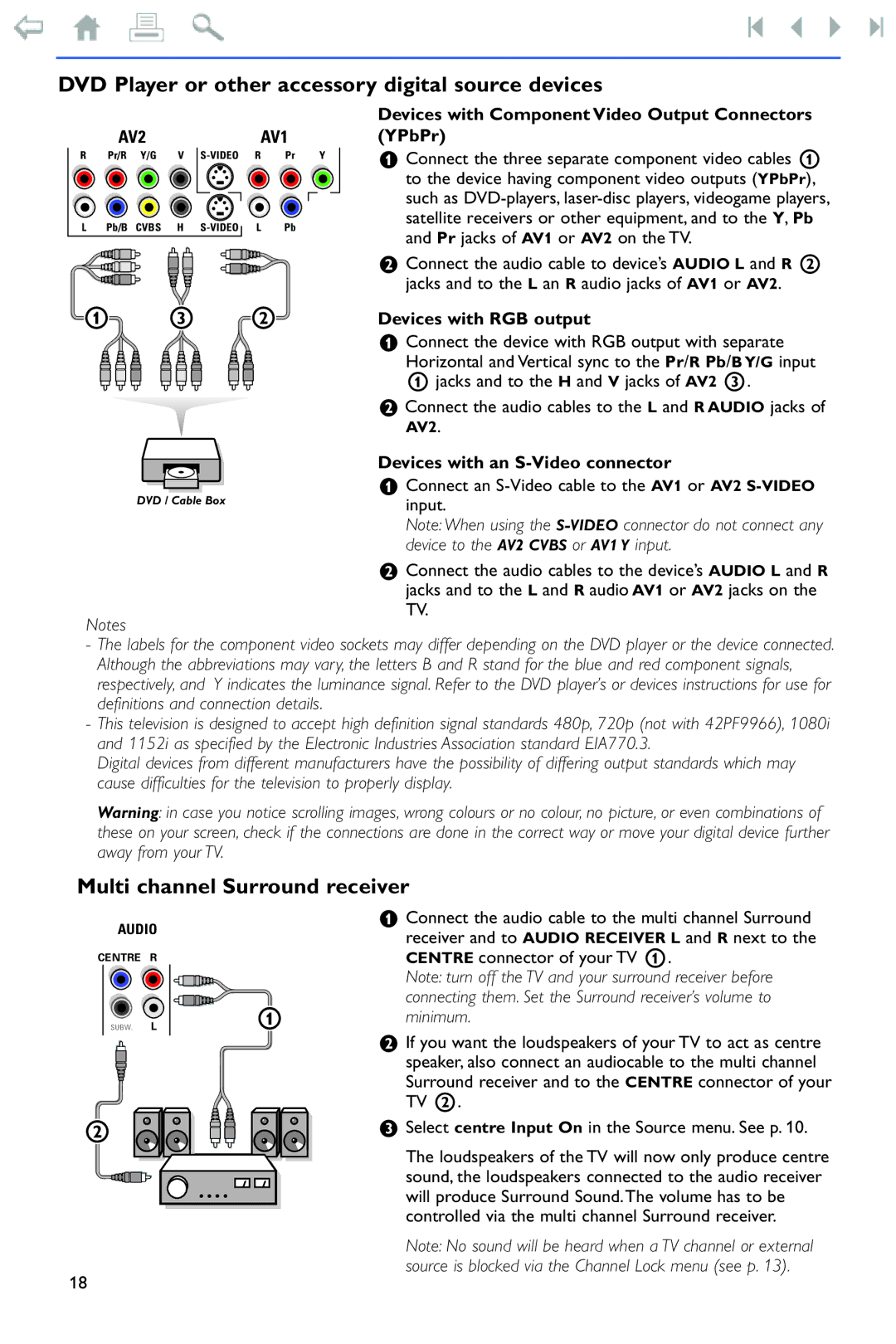
DVD Player or other accessory digital source devices
|
|
|
|
|
|
|
| Devices with Component Video Output Connectors |
| AV2 |
|
| AV1 |
| (YPbPr) | ||
R | Pr/R | Y/G | V | R | Pr | Y | & Connect the three separate component video cables 1 | |
|
|
|
|
|
|
|
| |
|
|
|
|
|
|
|
| to the device having component video outputs (YPbPr), |
|
|
|
|
|
|
|
| such as |
L | Pb/B | CVBS | H | L | Pb |
| satellite receivers or other equipment, and to the Y, Pb | |
| and Pr jacks of AV1 or AV2 on the TV. | |||||||
|
|
|
|
|
|
|
| |
|
|
|
|
|
|
|
| é Connect the audio cable to device’s AUDIO L and R 2 |
|
|
|
|
|
|
|
| jacks and to the L an R audio jacks of AV1 or AV2. |
| 1 |
| 3 |
| 2 |
|
| Devices with RGB output |
|
|
|
|
|
|
|
| & Connect the device with RGB output with separate |
Horizontal and Vertical sync to the Pr/R Pb/B Y/G input 1 jacks and to the H and V jacks of AV2 3.
é Connect the audio cables to the L and R AUDIO jacks of
AV2.
Devices with an S-Video connector
& Connect an
DVD / Cable Box | input. |
| |
| Note: When using the |
| device to the AV2 CVBS or AV1 Y input. |
| é Connect the audio cables to the device’s AUDIO L and R |
| jacks and to the L and R audio AV1 or AV2 jacks on the |
| TV. |
Notes
-The labels for the component video sockets may differ depending on the DVD player or the device connected. Although the abbreviations may vary, the letters B and R stand for the blue and red component signals, respectively, and Y indicates the luminance signal. Refer to the DVD player’s or devices instructions for use for definitions and connection details.
-This television is designed to accept high definition signal standards 480p, 720p (not with 42PF9966), 1080i and 1152i as specified by the Electronic Industries Association standard EIA770.3.
Digital devices from different manufacturers have the possibility of differing output standards which may cause difficulties for the television to properly display.
Warning: in case you notice scrolling images, wrong colours or no colour, no picture, or even combinations of these on your screen, check if the connections are done in the correct way or move your digital device further away from your TV.
Multi channel Surround receiver
&Connect the audio cable to the multi channel Surround
AUDIO |
| receiver and to AUDIO RECEIVER L and R next to the | |
|
|
| |
CENTRE | R |
| CENTRE connector of your TV 1. |
|
|
| Note: turn off the TV and your surround receiver before |
|
|
| connecting them. Set the Surround receiver’s volume to |
SUBW. | L | 1 | minimum. |
|
| ||
2
éIf you want the loudspeakers of your TV to act as centre speaker, also connect an audiocable to the multi channel Surround receiver and to the CENTRE connector of your TV 2.
“Select centre Input On in the Source menu. See p. 10.
The loudspeakers of the TV will now only produce centre sound, the loudspeakers connected to the audio receiver will produce Surround Sound. The volume has to be controlled via the multi channel Surround receiver.
Note: No sound will be heard when a TV channel or external source is blocked via the Channel Lock menu (see p. 13).
18
